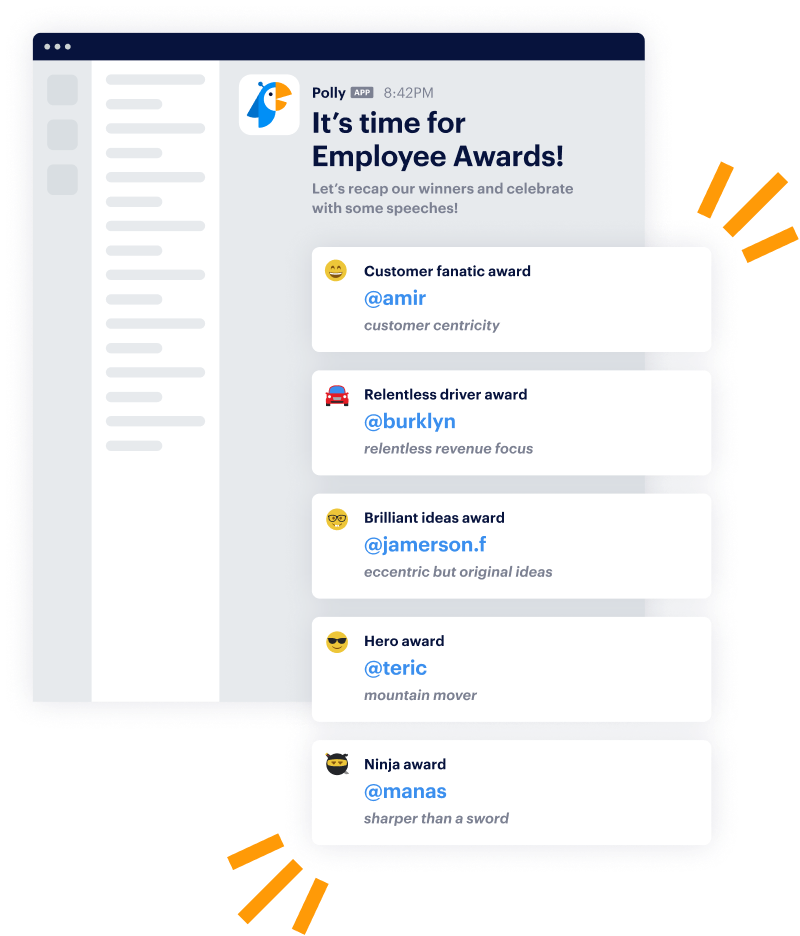 When top talent retention is a constant challenge, when team members stay silent during meetings, or when your surveys show low employee satisfaction, your employee morale is likely in trouble.
When top talent retention is a constant challenge, when team members stay silent during meetings, or when your surveys show low employee satisfaction, your employee morale is likely in trouble.
Frustratingly, low employee morale often coincides with work environments that have less trust, which is one reason an open-door policy alone may not result in meaningful change. Instead, you need to focus on improving the overall employee experience.
To do so, you can consider offering more professional development, support, recognition, and work-life balance. Plus, you can look at improving your communication with your teams and implementing their feedback.
In this article, we'll explore:
- What is employee morale?
- How employee morale affects your business
- What are examples of high employee morale?
- What are examples of low employee morale?
- Nine focus areas to help boost employee morale
What is employee morale?
High employee morale will naturally coincide with high employee engagement. Gallup defines employee engagement as "the involvement and enthusiasm of employees in their work and workplace." That enthusiasm described is also known as morale, and it's equally as crucial as work performance itself.
Factors that may affect positive employee morale include:
- A solid and competent management style
- Quality of communication between team members
- Employee recognition
- Remote work support
- Work-life balance
- Professional development opportunities
- Wellness and mental health support
- Incentive programs for top contributors
- Low turnover rates
How employee morale affects your business
Morale can make or break your bottom line. High morale at work manifests in greater creativity, community, and productivity. With the team at its happiest and feeling positive about their work, it leads to more focus, less paid time off, and less stress (which can affect the team's overall well-being).
If the company hits a rough patch and requires extra hard work from the team, strong morale and employee motivation can help everyone power through. Team members that feel valued and engaged will be empowered to help the company recover more quickly.
On the flip side, when employees spend eight hours a day in an environment with low team morale, it can drive them to absenteeism or create high employee turnover rates when they’ve finally had enough. If we look at this on a smaller scale, low morale may cause employees to be less likely to propose a new solution to a problem or speak up when overloaded with tasks.
What are examples of high employee morale?
Gallup's State of the Global Workplace: 2021 Report uncovered that among 43 countries studied, the highest daily stress in 2020 occurred in the U.S. and Canada.
The same report found that while it was statistically a more stressful year, employee engagement was high. The unexpected correlation may be due to the increase in remote teams and the leaders who invested their time to support remote workers. A higher cadence of intentional check-ins resulted in more meaningful employee feedback and, ultimately, engagement.
Polly helps teams offer engaging feedback within the tools they’re already using. When you respect the team's workflow, regularly ask for input, and implement their suggestions, you might find a positive change in employee morale.
Signs that you're fostering a good work culture
- Coworkers voluntarily socialize together
- Employees willingly contribute outside regular work hours
- There's more honesty and transparency in one-on-one meetings
- An increase in internal referrals from top talent
What are examples of low employee morale?
Low morale is palpable even within distributed teams. The dip can result from burnout or other factors like a problematic manager, lack of company vision, or how their skill sets fit into the company's future. In healthy feedback cultures, usually, leadership can identify issues before they snowball.
Causes for low employee morale can range from lack of material tools to support their workload to other intangibles like lack of recognition, purpose, or clear career trajectory.
Warning signs of low employee morale
- Employees showing up late or not at all
- Conflicts or jealousy between coworkers
- Increased negative feedback or reviews from customers or clients
- Apathy towards daily tasks or projects
- Poor performance
- Low employee retention
- Emotional outbursts
- A lack of participation from team members in meetings
- Gossip
It may seem like a daunting task, but you can bring the morale up with some focus, time, and attention. For more ideas, keep reading.
9 focus areas to help boost employee morale
Consider a proactive approach by investing in these key areas to keep your momentum or get back on track:
👄 Communication
We don't necessarily mean that you need to add more of it. That can feel like micromanaging, even with the best of intentions. Instead, try creating direct channels with your employees for transparency and two-way feedback with communication tools like Slack. Don't just set it and forget it — normalize frequently asking for feedback as the leader.
🔁 Consistent feedback practices
Feedback goes hand-in-hand with communication. Apps like Polly build a more consistent feedback practice that sets the tone for an open-door mentality with automated and consistent reminders and requests for team feedback. It routinely builds trust and engagement while identifying trends to help improve the workplace and morale.
🧰 Supportive tools
This can include everything from an ergonomic desk and chair to helpful software. Supportive tools can also include things that encourage work-life balance, like a stipend for a daily coffee so remote team members can easily work outside the home.
🎈Make time for fun
Using trivia, for example, quickly brings distributed teams together and creates a playful energy. When you make room for fun with social games, it helps to lighten the mood, build rapport, and bring the team together. This can help to alleviate some of the day-to-day stress and help coworkers get to know each other outside of their professional roles.
👑 Employee recognition
At work, focusing on the day's problems can easily take over the meetings. Ample time should be set aside to celebrate when the team overcomes an obstacle or a teammate goes above and beyond. Whether it's symbolic with employee awards or an actual physical gift, recognition is an easy, high-impact way to make your team members feel valued and stay loyal.
🌱 Professional growth
Professional growth looks different to everyone; maybe it's a promotion or the opportunity to upskill on the company dime. Upping communication and trust with a feedback loop provides insight into how to best support your team's trajectory.
🚴 Wellness stipends
Health is on everyone's mind at the moment, even more than usual. A wellness stipend is a budget set aside for employees to use towards fitness classes or memberships, mindfulness coaching, books, or even gadgets that help them track their physical wellness goals! Looking for ways to reduce stress and create more balance will leave your team feeling refreshed and refocused rather than frustrated and frazzled.
🌈 Diversity
Creating opportunities for people to hear from other generations, backgrounds, and skill levels can make work more rewarding. A People Management study found that teams with greater diversity are 87% better at decision making.
⚖️ Work-life balance
Many companies consider working from home a perk. The reality for many is that it's hard to switch off from work when you're at home, which can lead to burnout. Be extra clear with team members about logging off after a set number of hours so people can get proper downtime, even if it's something you assume they already know.
Polly has the tools to keep the morale high
 A positive workplace culture involves stimulating work, respectful communication, and finding ways to make the job easier. Rather than guessing your way through the solutions to boost employee morale, implement a feedback loop that gives employees ongoing opportunities to speak up about what's important to them.
A positive workplace culture involves stimulating work, respectful communication, and finding ways to make the job easier. Rather than guessing your way through the solutions to boost employee morale, implement a feedback loop that gives employees ongoing opportunities to speak up about what's important to them.
Using Polly helps managers understand their team members' individual needs. Our library of templates features many carefully thought-out topics. It creates a painless way for employees to share constructive feedback.Polly provides a proactive approach for team feedback with surveys, virtual suggestion boxes, social games and team awards.
Try Polly free to strengthen your engagement strategy, team connection, and employee morale.
Try Polly for free to instantly improve your employee engagement.

Written by Briana Biancolin
As a nomadic freelance writer, story lover, and professional snacker from Toronto, Canada, Briana's love of writing (and entrepreneurship) started as a kid when she would take the proceeds from her lemonade stand to buy notebooks and pens. After 5 years in creative recruitment, she took the plunge into freelance life, moved to Europe, and began writing full-time on topics like start-ups, wellness, design, travel, and tech.







